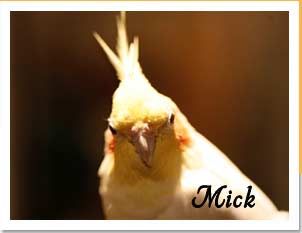Sprouting Made Simple
by Chloe Redon The purpose of this article is not to convince you to feed sprouts to your birds. There are numerous articles on the Internet about the nutritional value of sprouts. The purpose of this article is to provide a quick and easy set of sprouting instructions for those of you who have been confused or have felt that sprouting was complicated and difficult. Sprouting is EASY!
The purpose of this article is not to convince you to feed sprouts to your birds. There are numerous articles on the Internet about the nutritional value of sprouts. The purpose of this article is to provide a quick and easy set of sprouting instructions for those of you who have been confused or have felt that sprouting was complicated and difficult. Sprouting is EASY!
I will, however, say one thing about the benefits of sprouting. Trying sprouted and germinated seeds is a great way to move a bird off of a seed-only diet. Most birds who eat only seed will find germinated seeds close enough that they will readily eat them. As the days and weeks go on, slowly soak and germinate the seeds (and grains) longer and longer for each serving, until your bird is eating sprouted seeds and trying sprouted grains and legumes. Read More
Don't Underestimate Budgies
by Michelle Yesney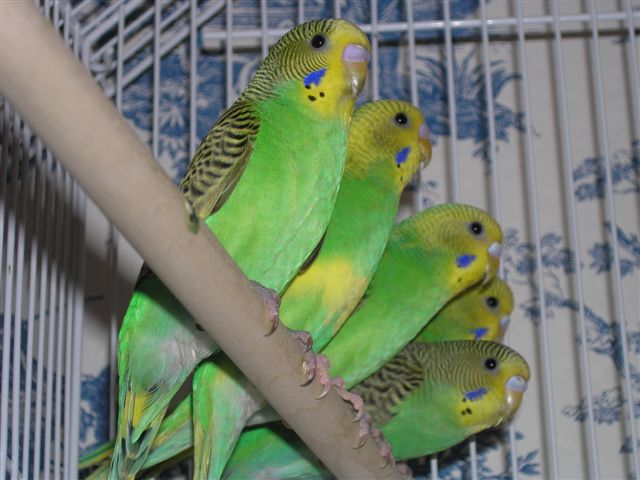 When most people think of pet birds, they think of budgies (parakeets in the U.S.). The smallest hookbills, 30 grams and about 4 inches long. The first pet of dozens of children. What they usually remember is one forlorn little bird in a small cage with a swing, a cuttle bone, a small dish of gravel, and a couple of dowel perches. He lived on a seed diet (Hartz Mountain, bought at the grocery store), with (maybe) an occasional small dish of “treat” (yellowish powder with a few seeds in it). Read More
When most people think of pet birds, they think of budgies (parakeets in the U.S.). The smallest hookbills, 30 grams and about 4 inches long. The first pet of dozens of children. What they usually remember is one forlorn little bird in a small cage with a swing, a cuttle bone, a small dish of gravel, and a couple of dowel perches. He lived on a seed diet (Hartz Mountain, bought at the grocery store), with (maybe) an occasional small dish of “treat” (yellowish powder with a few seeds in it). Read More
Pet Trusts
by L. Robin ChangIn chatting with other fellow pet owners, I am amazed by the incredible statistics recited about pet ownership. “Almost two-thirds of American households own a pet.” “Dogs outnumber children in San Francisco.” But one single statistic, much more troubling than amazing, always sticks out in my mind. According to 2nd Chance 4 Pets, a Los Gatos, California, based nonprofit organization, nearly 500,000 pets are killed every year in shelters and veterinarian offices after their owners die. As pet owners, we love and cherish our pets, and treat them as members of our families. Why shouldn’t we plan to provide for them just as we do for our parents, children, and other loved ones? Read More
Challenge Grant
by Pamela Lee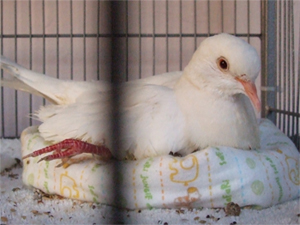
Mickaboo is running low on funds right now, so some Mickaboo Directors have come together to offer a challenge grant, a la many public television stations (but without the pledge breaks!). To wit - these generous folks will match up to $5,000 of the donations Mickaboo receives between now and July 31.
Donate using any of these methods:
- Send a check to Mickaboo Companion Bird Rescue, PO Box 697, San Jose, CA 95106
- Donate online using the "Donate" or "Network for Good" links on the left of our homepage, www.mickaboo.org
And, if you are lucky enough to have an employer who matches your charitable contributions - don't forget to apply for those too, to REALLY leverage your donation!
Every contribution counts, no matter how small you might think it is. THANKS in advance for your generosity!
Mickaboo Volunteer Helps Long-Distance Bird Lover
by Vicki Ronchette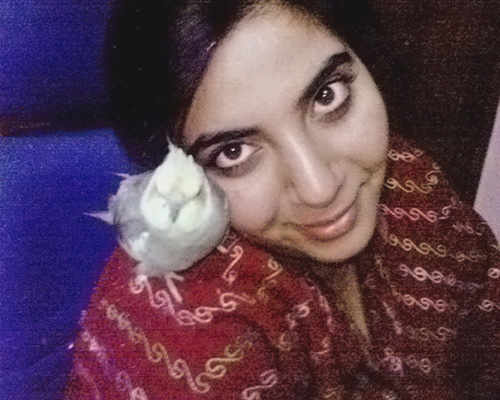 Mickaboo's volunteers are the backbone of the organization. There are so many dedicated, hardworking volunteers that make Mickaboo what it is. One volunteer in particular has made quite an impact halfway around the world.
Mickaboo's volunteers are the backbone of the organization. There are so many dedicated, hardworking volunteers that make Mickaboo what it is. One volunteer in particular has made quite an impact halfway around the world.
Virginia Nevin has been volunteering for Mickaboo for about 6 years. She lives in San Bruno with her own flock which includes 2 Meyer's parrots, an African ringneck and a Jenday conure. She also has two foster cockatiels, including a hospice cockatiel that was expected to die over 3 years ago. In her care, he is still alive today. In the past, Virginia has fostered an Eastern rosella, canaries, button quail, parakeets, cockatiels and a couple of wild conures. In addition to fostering, Virginia also transports birds to their vets, teaches classes for the public on basic bird care and classes for volunteers on how to do phone screens, picks up emails for Mickaboo once a week and performs other Mickaboo administrative tasks. She also helps at adoption fairs when she can. Read More
Help One Bird at a Time
by Chloe RedonIf you volunteer for an animal rescue like Mickaboo long enough, it’s easy to have days when you feel overwhelmed by the task at hand; when you feel like we’re taking in birds faster than we’re adopting them out; when you worry about where our next foster home will come from; when you agonize about how you’re going to pay the next vet bill; and certainly when you’re affected by the sad stories that come across our online message board every day. Read More
Birds Outside
by Elizabeth Young, MickaCoo Pigeon & Dove Rescue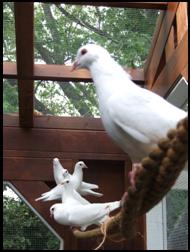
Every issue, I have the privilege of submitting something on behalf of MickaCoo Pigeon & Dove Rescue to be considered for publication in Mickaboo’s newsletter, The Mickaboo Bird Rescue Companion, and while this quarter has been filled with lots of exciting stories, there’s one topic that has really been on my mind lately and that, I think, is very important to all of our birds, pigeons and parrots alike- and that is being outside.
The knowledge that I’ve developed these past couple of years has been pigeon-focused and, even with them, I do not consider myself an expert so this article is not being offered to you as an authoritative piece (as some of our members are capable of offering) but rather as a conversation starter. Read More
2011 Calendar Contest!
by Pamela LeeHelp us choose which photos to feature in our 2011 Calendar! Go here to see our pictures and vote on them!
Voting ends at midnight, September 30, so we can publish the calendar for your holiday gifting pleasure. The 2011 Calendar will be available at Mickaboo's Cafepress Store. Email any questions to pr@mickaboo.org.
Beak Language — Understanding Bites
by Jonathan HarrisAll parrots bite — even, as Mira Tweti says, the hands that feed them. Sharp beaks and strong jaws can make these painful, sometimes bloody, experiences for their human companions, especially when they are unexpected. Humans used to the mild, rare, and easily controlled bites of dogs and cats often misinterpret the frequency of parrot bites as hostility or aggression. We may write them off to parrots being "wild" animals and restrict physical contact accordingly. Or if we want contact, we may label biting a "problem behavior" and try to extinguish it. Yes, parrots are wild, meaning we must try to understand and approach them on their terms, more than is necessary with our long-domesticated companions, who do a lot of that work for us. Certainly we should try to avoid and correct biting that is excessive or associated with trauma. But to interpret every nip as hostile both undermines our self-confidence as caregivers and distorts our perception of birds' moods and intentions. Even if we see ourselves as ultimately responsible, it imposes a false, "good-bad" dichotomy on their behavior, making each little feathered Skywalker the vessel for an inner Sith waiting to be pushed over to the Dark Side. Read More
Bird of the Month
by The Editor
 Hello, I'm Princess Alexandra of India but you can call me Alex for short. I came to Mickaboo a while ago, was adopted by a nice family and then came back when they could no longer keep me. This time I am ready to find a true forever home!
Hello, I'm Princess Alexandra of India but you can call me Alex for short. I came to Mickaboo a while ago, was adopted by a nice family and then came back when they could no longer keep me. This time I am ready to find a true forever home!
I'm a sweet, friendly girl in one-on-one situations with experienced handlers and I love stepping up and visiting with my human companion. My foster mom has taught me to use my quieter "inside voice" when I am around people, but I like to add my own sound effects like a wind-up whistle to keep things interesting. When I'm really excited I like to imitate a car alarm! My favorite creature comfort is taking long, luxurious baths in a dog dish (no dogs allowed!), since we couldn't find a birdie bath that was big enough to satisfy me.
I'm one of Mickaboo's longest-fostered birds. Can you help give me a permanent home? Read More
